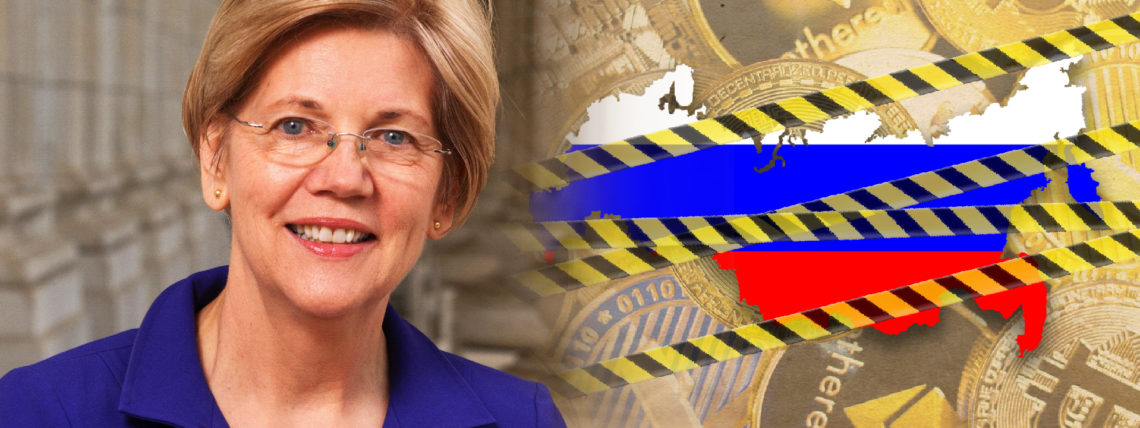- The use of business vehicles to conceal asset ownership and sources of funds, shell corporations to undertake international wire transfers, third-party identity protection, and newly formed accounts to send or receive monies from a sanction institution were among the methods identified.
- One of the elements of Warren’s proposed crypto law which is still in draught form will require local crypto exchanges to give detailed records of Towards the Treasury Department, customers’ identities as well as transactions to personal cryptocurrency accounts. It also intends to make corporations to choose between doing business in the United States or with sanctioned individuals and entities by threatening secondary sanctions on overseas crypto exchanges.
- Russia regardless of payment method, and sanctions prohibiting U.S. businesses and citizens from transacting with Russia regardless of payment method.
Elizabeth Warren’s latest draught crypto bill, if passed, will mandate local crypto exchanges to disclose full records of clients’ names and transfers to private crypto wallets to the Treasury Department. Senator Elizabeth Warren of the United States is working on a measure to prohibit the use of cryptocurrency as a means of evading economic penalties.
Anti-Crypto Effort
Warren’s latest anti-crypto effort coincides with a US government push to eliminate the potential of Russia utilizing crypto to evade a slew of economic sanctions imposed on the country. According to NBC News, one of the elements of Warren’s proposed crypto law which is still in draught form will require local crypto exchanges to give detailed records of users’ names and transfers to private crypto wallets to the Treasury Department. It also intends to make corporations to choose between doing business in the United States or with sanctioned individuals and entities by threatening secondary sanctions on overseas crypto exchanges.
According to NBC, the Treasury Department’s Financial Crimes Enforcement Network (FinCEN) is also considering similar restrictions based on Warren’s bill. For the past week or two, Ukraine’s deputy minister of digital transformation, Alex Bornyakov, has been urging crypto exchanges to prohibit Russian users. Top crypto exchanges like Binance, Coinbase, and Kraken, on the other hand, have stated that they will not apply a blanket ban and have highlighted their commitment to complying with US sanctions. Senator Warren has been a vocal critic of the industry for some time. During a committee hearing in 2021, she dubbed DeFi the most dangerous component of crypto, filed a bill to investigate crypto’s role in ransomware, and blasted the Ethereum network for its exorbitant costs. As a result, industry observers are not surprised that she has taken the opportunity to advocate for stricter controls.
Warren, who was one of a number of Senators who wrote to Treasury Secretary Janet Yellen about the matter last week, said earlier today on Twitter that her measure will ensure crypto isn’t exploited by Putin and his cronies to sabotage our economic sanctions. While the prospect of Russia utilizing crypto to circumvent sanctions has gotten a lot of attention, experts like Jake Chervinsky, the head of policy at crypto policy promoter the Blockchain Association, contend that the country can’t and won’t utilize crypto to avoid sanctions. Chervinsky cited a lack of Russian crypto infrastructure to meet the Russian state’s monetary needs, sanctions prohibiting U.S. businesses and citizens from transacting with Russia regardless of payment method, and sanctions prohibiting U.S. businesses and citizens from transacting with Russia regardless of payment method.
Warren’s regulatory campaign comes just a week after Federal Reserve Chair Jerome Powell and a bipartisan group of House members called for federal action on cryptocurrency in light of Russia. The scenario with Russia, according to Powell, highlights the necessity for strong regulatory frameworks in the sector to prevent these unbacked cryptocurrencies from functioning as a vehicle for terrorist financing and just general criminal conduct, tax dodging, and the like. FinCEN issued an alert earlier this week urging all financial institutions to be watchful against Russia’s efforts to evade US sanctions, including a set of red flags to spot any evasion activity.
Potential Sanctions Evasion
The use of business vehicles to conceal asset ownership and sources of funds, shell corporations to undertake international wire transfers, third-party identity protection, and newly formed accounts to send or receive monies from a sanction institution were among the methods identified. According to the FinCEN alert:
All financial firms, even those with awareness of CVC flows, including CVC exchangers and administrators, must identify and report suspicious activity associated with potential sanctions evasion, as well as to conduct appropriate risk-based customer due diligence or, where necessary, enhanced due diligence.
ALSO READ: Steve Wozniak calls Bitcoin pure-gold mathematics

Andrew is a blockchain developer who developed his interest in cryptocurrencies while pursuing his post-graduation major in blockchain development. He is a keen observer of details and shares his passion for writing, along with coding. His backend knowledge about blockchain helps him give a unique perspective to his writing skills, and a reliable craft at explaining the concepts such as blockchain programming, languages and token minting. He also frequently shares technical details and performance indicators of ICOs and IDOs.


 Home
Home News
News










